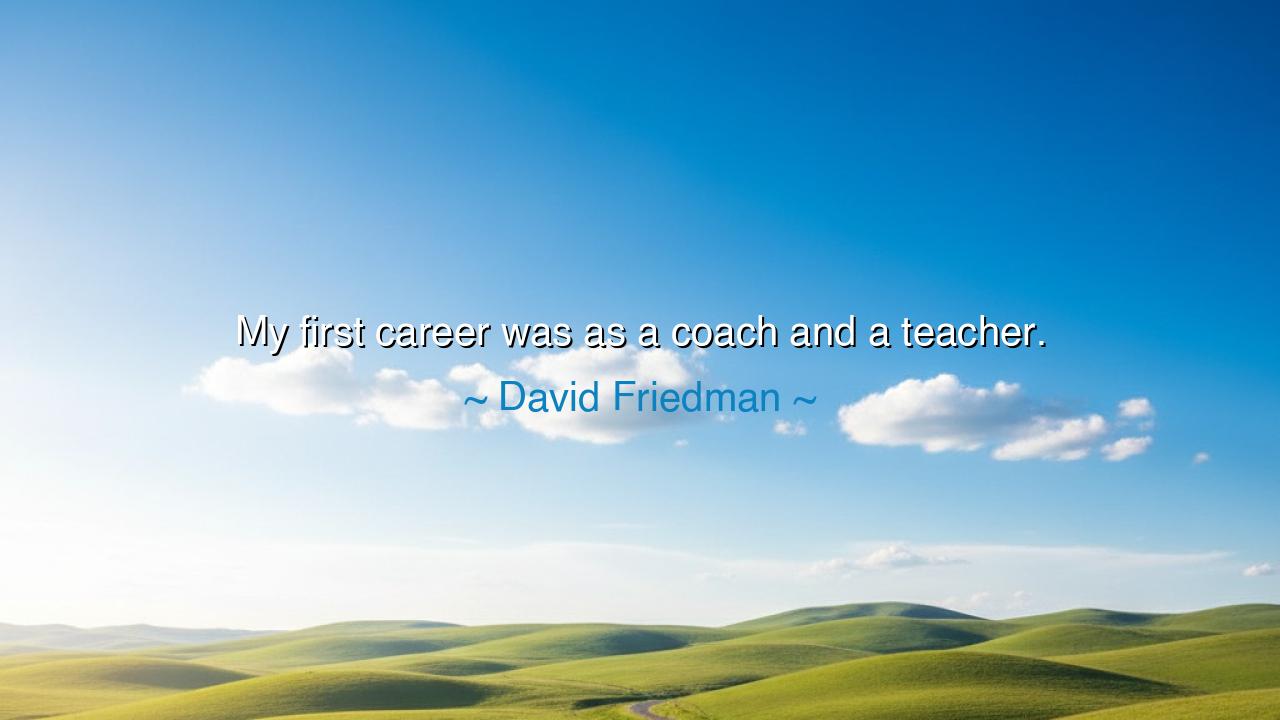
My first career was as a coach and a teacher.






Hear the words of David Friedman, who declared with clarity and humility: “My first career was as a coach and a teacher.” In this statement lies more than mere autobiography. It is the recognition that the noblest foundation of any life’s work is not wealth or glory, but the shaping of minds and the guiding of souls. For to be a coach is to train the body and the spirit for discipline and courage; to be a teacher is to awaken the intellect and the heart to knowledge and wisdom. And in both roles, one takes upon oneself the sacred duty of lifting others higher.
When Friedman speaks of his first career, he reminds us that beginnings matter. The roots of a man’s life reveal the soil from which his later work grows. Before he turned to other callings, his earliest service was to guide, to teach, to train. This beginning reveals that whatever paths he later walked, his spirit was first forged in the act of giving, not in the act of taking. To stand before students, to labor with athletes, is to learn patience, sacrifice, and the joy of watching another succeed. Such virtues, once planted, bear fruit in every later field of life.
Consider the example of John Wooden, the legendary basketball coach. Though he achieved greatness, he never saw himself merely as a collector of victories. He often said, “I am a teacher first, a coach second.” His practices were classrooms, his games lessons in character. Through him, thousands learned not only how to play, but how to live. This is the hidden power of those who begin, like Friedman, as coaches and teachers: their legacy cannot be measured only in wins or grades, but in the unseen transformation of lives.
The role of the coach is ancient. In the gymnasiums of Greece, the trainer prepared young men not only for games, but for citizenship and war. He taught strength, endurance, and loyalty. Likewise, the role of the teacher is eternal. From Confucius to Socrates, from the village schoolhouse to the universities of the modern age, the teacher has carried the torch of wisdom through the generations. To begin life in these roles is to step into a river of tradition that has shaped civilizations.
Yet there is a deeper lesson: beginnings do not bind us, but they reveal us. A man may move on to other careers, but the spirit of his first calling remains. Once a teacher, always a teacher; once a coach, always a coach. For even when he no longer stands in a classroom or on a field, the habits of guiding, explaining, encouraging, and correcting follow him. Whatever Friedman became after his first career, the imprint of his beginnings—his service as coach and teacher—stayed with him as the compass of his life.
What, then, must we learn? That our first labors, however humble, are not wasted. They shape the soul, they form the habits, they prepare us for greater tasks. If your beginning is as a servant, it teaches humility; if as a craftsman, it teaches patience; if as a teacher, it teaches wisdom. Do not despise your first work, for it is the root of your future strength. Like Friedman, honor it, and let it remain your foundation even as you climb to other heights.
Therefore, O seekers of truth, remember this: to teach and to coach is to serve as midwife to greatness in others. It may not bring immediate fame, but it brings eternal reward. If life calls you to such work, embrace it, for you will carry its lessons forever. And if you leave it for another path, never forget where you began, for the roots of your spirit are there. For in truth, the highest career is not what one earns, but what one gives—and he who begins as teacher and coach has begun in greatness already.






AAdministratorAdministrator
Welcome, honored guests. Please leave a comment, we will respond soon